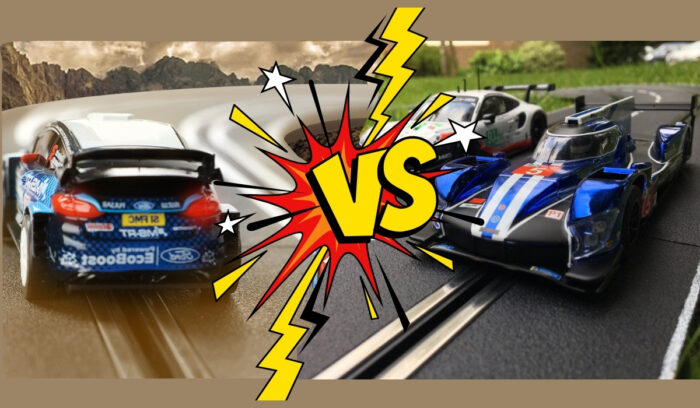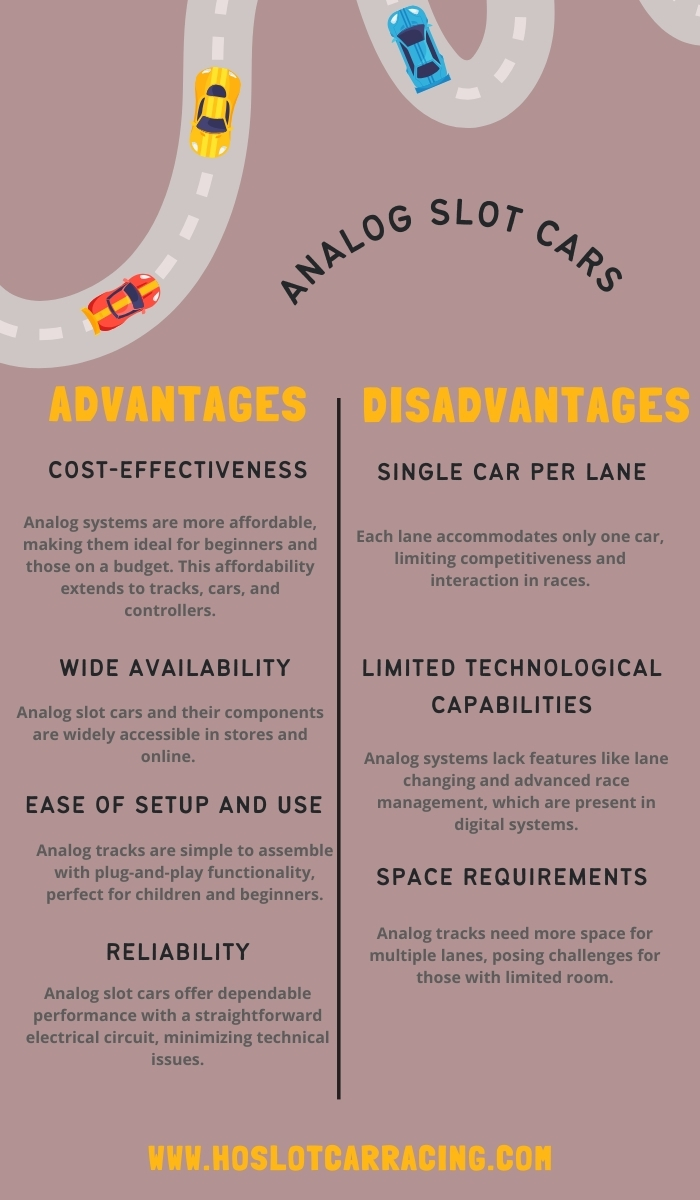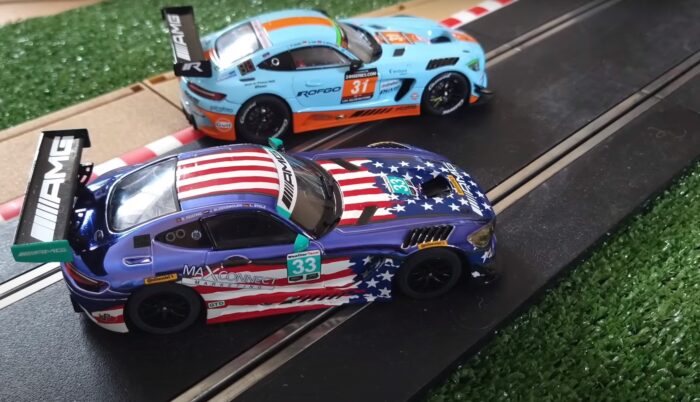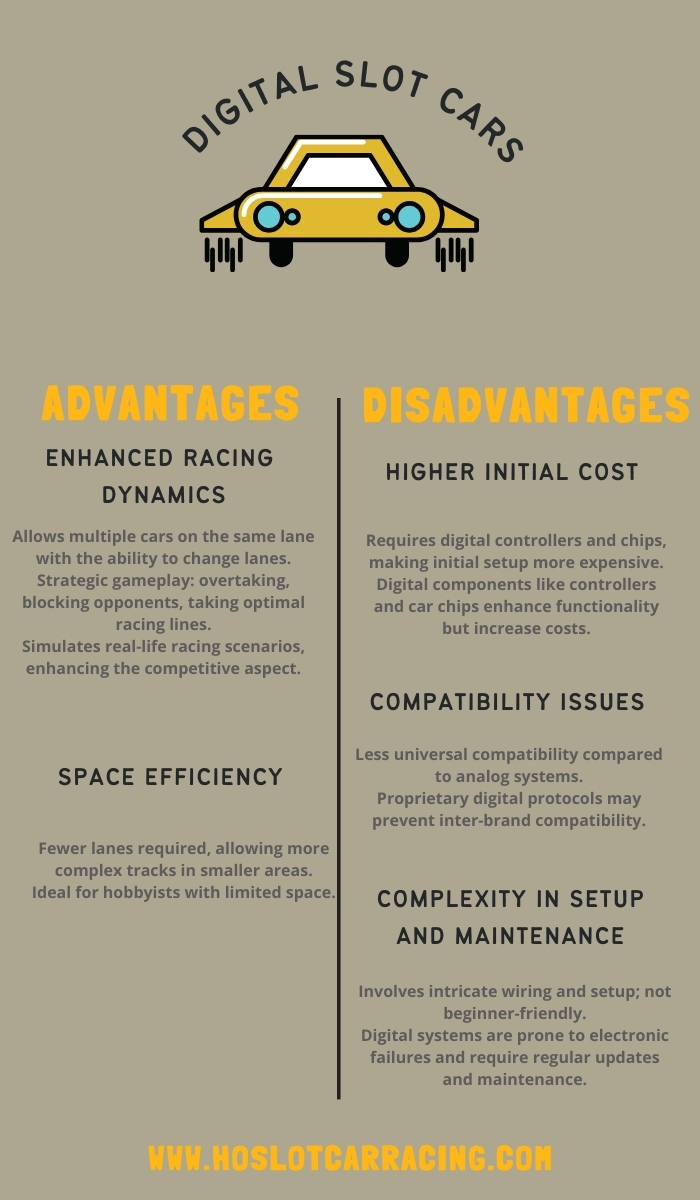In my collection, I have both electric and digital rc slot cars.
So, choosing between these two is something I do not pay attention to too much when obtaining new models. I enjoy both.
Still, it is important to say that there are significant differences between these two concepts you must be aware of.
That’s the reason I committed to create this piece and shed light on the main differences.
Table of Contents
Electric (Analog) Slot Cars
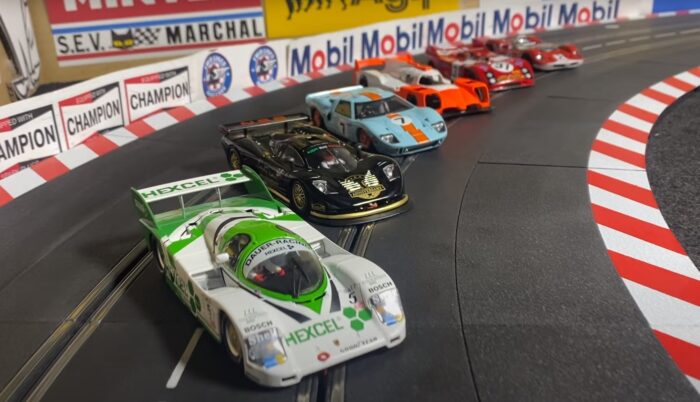
Analog slot cars, often referred to as electric slot cars, operate within dedicated lanes on a track.
Each car is controlled by adjusting the voltage to the track’s metal rails, which in turn powers the car’s motor. The car’s speed is managed by a hand-held controller that modulates this voltage.
Analog tracks are typically straightforward, consisting of a series of fixed lanes, each accommodating one car.
Advantages
Now, let us go through the advantages
1. Cost-Effectiveness
One of the main advantages of analog slot cars is their cost-effectiveness.
These systems are generally more affordable than digital ones, making them an attractive option for beginners or those on a tight budget.
The initial investment for an analog slot car set is significantly lower, as it does not require the sophisticated technology found in digital systems.
Affordability extends to additional components such as track pieces, cars, and controllers, which are also cheaper compared to their counterparts.
Consequently, hobbyists can expand their track layouts and car collections without incurring high costs, allowing for a more accessible entry into the world of slot car racing.
2. Wide Availability
Analog slot cars are widely available, with a plethora of track pieces, cars, and accessories that can be easily found in hobby stores or online.
Extensive availability means that enthusiasts have a wide range of choices when it comes to building and customizing their tracks and collections. Established brands have a long history of producing analog slot car products, ensuring that parts and replacements are readily accessible.
The abundance of second-hand markets for analog slot cars offers even more opportunities for cost savings and variety, making it easy for collectors to find rare or vintage items.
3. Ease of Setup and Use
The setup and use of analog slot cars are straightforward, requiring minimal technical knowledge.
Assembling an analog track involves connecting track pieces and plugging in the power source, which can be accomplished quickly without the need for specialized tools or expertise.
The user-friendly nature of analog systems means that users can start racing almost immediately, without the need for extensive setup or programming.
A plug-and-play functionality is particularly beneficial for children and beginners who might find the complexity of digital systems overwhelming.
4. Reliability
Analog systems have a long-standing reputation for reliability, providing a traditional racing experience that many enthusiasts appreciate.
The technology behind analog slot cars is well-established, with decades of development ensuring dependable performance.
Unlike digital systems, which may require firmware updates or suffer from software glitches, analog slot cars operate on a straightforward electrical circuit, minimizing the risk of technical issues.
The traditional feel of analog slot car racing, with its tactile controllers and classic track designs, evokes a sense of nostalgia for many enthusiasts, preserving the timeless appeal of the hobby.
Disadvantages
Analog slot cars have some notable disadvantages you should know about.
1. Single Car Per Lane
The primary limitation is that only one car can run per lane, which significantly reduces the level of competitiveness and interaction during races.
In a typical analog setup, each lane is powered independently, meaning each car operates solely within its designated lane.
2. Limited Technological Capabilities
The technological capabilities of analog systems are limited compared to their counterparts.
Analog systems lack the advanced features that digital systems offer, such as lane changing and programmable race management.
In digital slot car racing, racers can switch lanes, allowing for overtaking and more complex race strategies.
3. Space Requirements
Moreover, analog setups generally require more physical space to create extensive and varied track layouts, which can be a constraint for those with limited room.
To accommodate multiple racers, more lanes are necessary, which in turn demands more space.
For instance, a track designed for four racers would need at least four lanes, each taking up additional width and length.
Digital Slot Cars
Digital slot cars represent a significant technological advancement in the world of slot car racing.
Unlike analog systems, digital slot cars allow multiple cars to run on the same lane, thanks to digital technology.
It is an innovation that enables exciting features such as lane changing, which adds a strategic element to racing.
Digital systems often come with programmable tracks and app integrations that enhance the overall racing experience.
Advantages
It comes with numerous advantages, the most prominent ones being:
1. Enhanced Racing Dynamics
One of the primary advantages of these slot cars is the enhanced racing dynamics they offer.
The ability to change lanes introduces strategic gameplay, allowing for overtaking and more competitive races.
This dynamic allows racers to simulate real-life racing scenarios, where tactics and positioning can significantly influence the outcome.
The possibility to block opponents, take the optimal racing line, and perform strategic maneuvers brings a new level of excitement and complexity to the races.
2. Space Efficiency
Digital setups are also more space-efficient, as fewer lanes are required to accommodate multiple cars.
In traditional analog setups, each car needs its dedicated lane, which can quickly consume a lot of space.
In contrast, digital tracks allow multiple cars to race on the same lane, which means a more complex and engaging track can be set up in a smaller area.
It is particularly beneficial for hobbyists with limited space, enabling them to create intricate track designs without needing a large layout.
Disadvantages
There are some disadvantages you need to be aware of as well.
1. Higher Initial Cost
The initial cost of setting up a digital system is higher due to the sophisticated technology involved.
It includes the need for digital controllers, chips for the cars, and potentially more expensive track pieces.
Digital controllers are more advanced than their analog counterparts, often featuring programmable settings and connectivity options that drive up the cost.
The cars themselves need to be equipped with digital chips, which allow them to communicate with the track and execute functions such as lane changes.
2. Compatibility Issues
Compatibility can also be an issue, as different brands may require specific digital chips or modifications to work together.
Unlike analog systems, where slot cars and tracks from different manufacturers can often be mixed and matched without issue, digital systems are less universally compatible.
Each brand may use a proprietary digital protocol, meaning that cars and tracks from one manufacturer may not work seamlessly with those from another.
3. Complexity in Setup and Maintenance
The complexity of setting up and maintaining a digital slot car system is higher compared to analog, which can be daunting for beginners or those less technically inclined.
Digital systems require more intricate wiring and configuration.
For example, setting up a digital track involves connecting lane changers, and digital controllers, and ensuring that the digital signals are properly transmitted throughout the track.
Digital cars and tracks have more electronic components that can fail or require updates. Troubleshooting issues with digital systems often involves diagnosing and fixing problems.
The Verdict
I already said, I enjoy and collect both. However, my heart somewhat leans towards electric slot RC cars.
The reason is rather simple: I started with them and developed an affection that still drives me today. Not to say that digital ones have a place in my heart.

